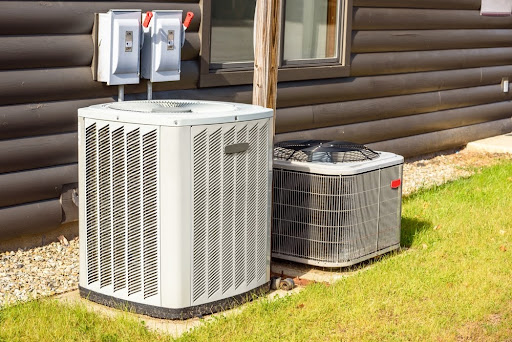When the temperatures start to drop, the question of how to best heat your home becomes a hot topic (pun intended). Do you stick with the trusty gas furnace, or is it time to consider the rising star of the heating world, the heat pump? If you’ve ever debated the merits of a furnace vs heat pump, you’re not alone. Many homeowners are left wondering which system will keep them the coziest, save them the most money, and run the most efficiently.
Choosing between a furnace or heat pump can feel like trying to pick between two equally appealing options: both will get the job done, but the results might be quite different depending on your home’s heating needs.
Your friends at G.F. Bowman are here to break down the pros and cons of each heating system to help you decide which one is the best fit for your home. Whether you're aiming to slash your energy bills, reduce your carbon footprint, or just stay comfortably warm during those frigid nights, we’ve got you covered.
How Do Furnaces and Heat Pumps Work?
Before deciding on a furnace or heat pump, it's important to understand how each system operates.
Furnaces: The Classic Gas-Powered Heater
Gas furnaces have been the gold standard for home heating for decades. These systems generate heat by burning gas and distributing hot air through your home’s ductwork. The process is simple: the furnace ignites the fuel, warms the heat exchanger, and then the blower moves the warm air through your ducts.
Furnaces are known for their ability to generate heat energy quickly, making them ideal for colder climates. However, they rely on gas lines, meaning you need access to natural gas or propane.
While gas furnaces are powerful, they need to be properly maintained. That's why it's important to schedule annual HVAC system maintenance with a trusted technician.
Heat Pumps: The Modern Energy-Saver
Heat pumps are newer to the heating game, but they're gaining popularity fast. Instead of burning gas to generate heat, heat pumps transfer heat energy from one place to another. In heating mode, heat pump systems pull warmth from the outside air (even in cooler temperatures) and move it indoors to keep your home cozy.
Heat pumps operate as both a heating and cooling system, making them a versatile option. In summer, the heat pump system works in reverse, moving warm air from inside your home to the outside, acting like an air conditioner.
There are different types of heat pumps, including:
- Air source heat pump
- Ground source heat pump (also known as geothermal heat pump)
- Ductless heat pump
Furnace vs Heat Pump: The Key Differences
Now that we’ve broken down the basics of each system, let's explore the crucial differences between the two.
Energy Efficiency
When it comes to energy efficiency, heat pumps tend to have the upper hand. Since they move heat energy rather than generate heat, they use less energy than gas furnaces. In fact, heat pumps provide up to three times more energy than they consume, making them an energy-efficient choice for moderate climates.
However, in colder climates, heat pumps run less efficiently. As the outdoor temperature drops, heat pumps require more energy to extract heat from the ambient air, which can increase energy costs.
On the other hand, natural gas furnaces are less affected by outside temperatures and can generate heat even in cold temperatures. While they may use more energy overall, they’re better suited for cold weather.
Heating Power in Cold Weather
Gas furnaces excel at keeping homes warm during frigid winters. Their ability to generate heat quickly and consistently makes them ideal for cold climates.
Heat pumps, however, can struggle when the temperature drops below freezing, as they rely on outside air temperature to transfer heat. In these cases, electric heat pumps may require supplemental heating from a furnace. This is called a dual-fuel heating system, and it's popular in Harrisburg homes for those who want to be energy-efficient without giving up their comfort.
A dual-fuel system pairs a heat pump with a gas furnace, allowing the heat pump to handle moderate temperatures and the gas furnace to kick in when it’s too cold for the heat pump to operate efficiently. This combination can provide the best of both worlds, giving you the energy efficiency of a heat pump and the reliable heat of a furnace.
Installation Cost
When considering the heat pump vs furnace debate, the installation cost is an important factor. Heat pumps are generally more expensive to install upfront compared to gas furnaces. However, because heat pumps operate as both a heating and cooling system, you could save money by not needing a separate air conditioning unit.
Furnaces, on the other hand, typically have a lower initial cost but may require additional expenses for air conditioning installation or ductwork upgrades.
Lifespan and Maintenance
Gas furnaces tend to have a longer lifespan compared to heat pumps. Furnaces can last anywhere from 15 to 30 years, depending on how well they’re maintained. In contrast, heat pump systems usually last 10 to 20 years due to the fact that they run year-round (both for heating and cooling).
When it comes to maintenance, both systems require regular servicing to stay efficient. Furnaces need routine checks to prevent potential safety hazards like carbon monoxide poisoning, while heat pumps should be inspected to ensure their heat exchangers and coils are clean.
Which System Is More Energy Efficient?
Energy efficiency is a major consideration when choosing between a furnace or heat pump.
Heat pumps are known for their high efficiency, especially in moderate climates. By transferring heat energy instead of creating it, electric heat pumps tend to use less energy compared to gas furnaces.
However, as we’ve mentioned before, cold climates pose a challenge for heat pumps. When the outside air temperature drops, heat pumps provide less heat energy, which can lead to higher energy consumption. In these cases, natural gas furnaces are a better option since they can generate heat more effectively in cold temperatures.
If you're looking for a balance of energy efficiency and power in all weather conditions, a dual-fuel system might be the answer. This system allows you to switch between a heat pump and a gas furnace depending on the outside air temperature.
Considerations for Colder Climates
While heat pumps work well in moderate climates, they often need supplemental heating in colder climates. If you live in an area where the temperature regularly falls below freezing, a natural gas furnace might be the better choice.
Alternatively, you can opt for a dual-fuel heating system that uses both a heat pump and a natural gas furnace. In this system, the heat pump handles heating during milder weather, and when the temperature drops too low for the heat pump to operate efficiently, the gas furnace takes over.
Indoor Air Quality and Safety
Indoor air quality is another factor to consider when upgrading your heater. Heat pumps tend to circulate cleaner air because they don’t burn fuel, which can release carbon monoxide and other pollutants. Gas heating systems, on the other hand, carry the risk of carbon monoxide poisoning if not properly vented and maintained.
In terms of safety, electric heat pumps are generally considered safer since they don’t rely on combustion to generate heat. If safety and indoor air quality are top priorities, a heat pump system may be the better option.
Which System Should You Choose?
Ultimately, your decision between a furnace or heat pump will depend on your home’s location, energy efficiency goals, and personal preferences. Heat pumps are a great option for those living in moderate climates who want an energy-efficient solution that provides both heating and cooling. For homeowners in colder climates, a gas furnace or a dual-fuel system may be the better choice for reliable heat during the winter months.
Keep Your Home Warm with G.F. Bowman’s Heating Services!
Whether you choose a furnace, heat pump, or dual-fuel system, keeping your home warm during the winter is crucial.
At G.F. Bowman, we offer expert furnace and heat pump services in Harrisburg and Lebanon, PA. Our experienced technicians are here to help with everything from installations to repairs. Contact us today to schedule a service and keep your home comfortable all year round!




 1..
1..
 2..
2..
 3..
3..
 4..
4..
 5..
5..
 6..
6..